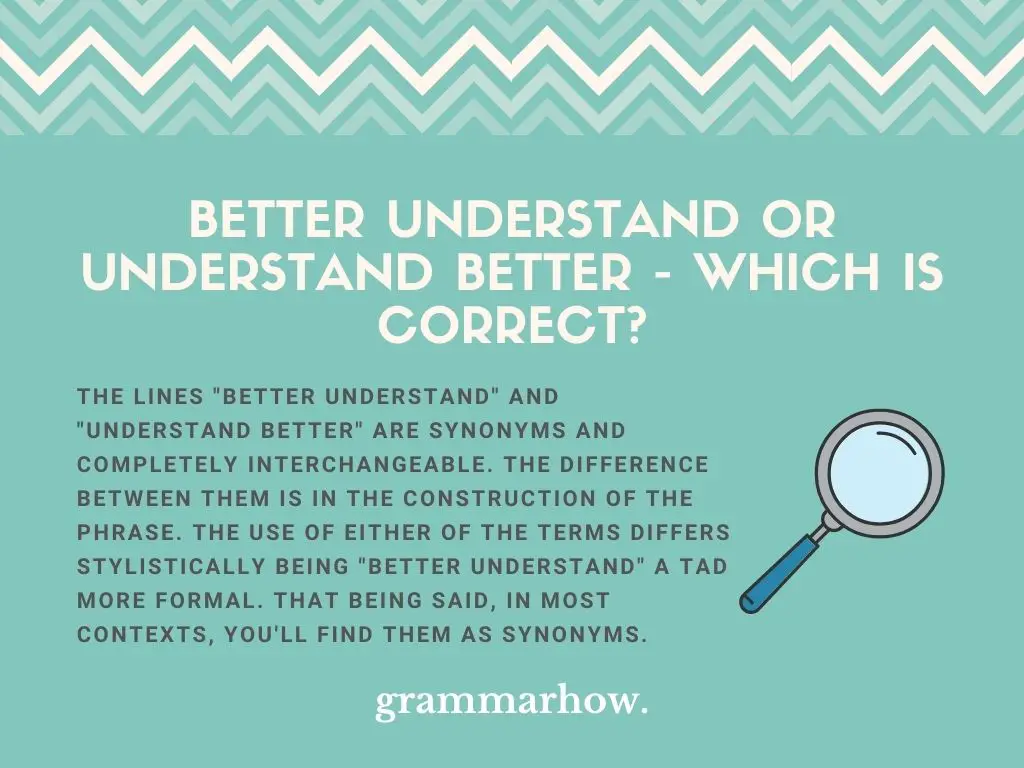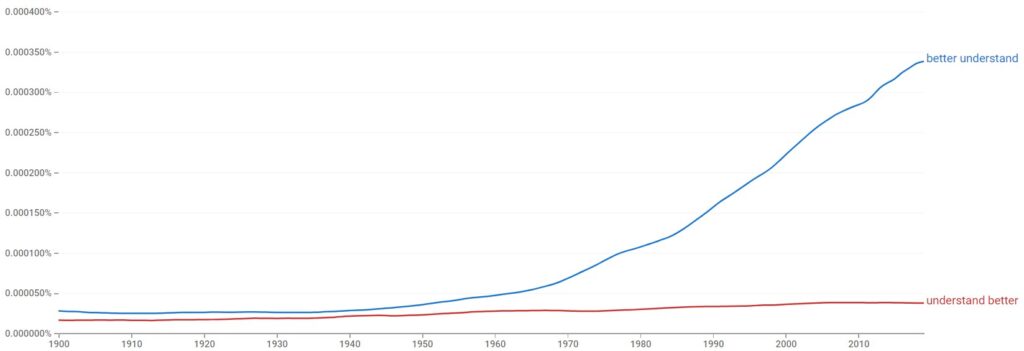Sometimes, we hear people saying “better understand” and other people saying “understand better”. But, the question arises; which of these is the correct form? If you find the same language pitfall, don’t worry because we’re about to clear all your doubts in just a handful of paragraphs.
Better Understand or Understand Better – Which Is Correct?
The lines “better understand” and “understand better” are synonyms and completely interchangeable. The difference between them is in the construction of the phrase. The use of either of the terms differs stylistically being “better understand” a tad more formal. That being said, in most contexts, you’ll find them as synonyms.

Perhaps, the only caveat when using these terms is where to place the adverb, the verb, and the object. Let’s pour this sentence into an example so it is clearer, you could say:
- “I understand the concept better after your explanation.”
Although it is accepted in colloquial English and informal scenarios, that is not the correct way to use these lines. You can place the adverb before or after the verb it modifies. For example “better understand the concept” or “understand the concept better” are correct uses of the English language that also work as synonyms.
Finally, while both terms, “better understand” and “understand better” can be exchanged, “better understand” is always considered more formal and suits such scenarios better.
Better Understand
To “better understand” something is to reach a clearer understanding of a subject that was already known or familiar. Moreover, it is a line that can be used before the understanding happened or after. For example, “you’ll better understand” or “I was able to better understand” are correct.
Let’s see how to use “better understand” in a sentence through some examples:
- I took a physics course to better understand what gravity does to the planet.
- To better understand his decisions, it is paramount that you think of him as the school’s principal.
- I wanted to better understand my mom, so I had a deep conversation with my grandma.
- She said she wanted to better understand the topic so instead of Google she went to the library.
- Teachers can help you better understand these books, but you still have to read them.
- There is no way to better understand a manual car’s clutch and transmission than driving one.
- If you want to better understand what’s going on in this town, you better follow me.
Understand Better
Saying you “understand better” a certain topic, person, or thing means you have a clearer vision of its meaning after a certain event. Furthermore, the same composition can be used for future or past events. For example, you can say “I did understand better” or “I will understand better”.
Let’s see how to use “understand better” in a sentence through some examples:
- I understand it all much better now that you’ve explained it to me.
- Marina said she will understand better once he takes the cooking class but thanks for the advice.
- Nowadays people always understand concepts better after looking things up on YouTube.
- I thought I would understand better with his explanation but I’m even more lost than before.
- Taking that class was so clarifying! I understand everything better now.
- The whole class was there to understand better; it was an emotional moment for me as a teacher.
- Michael commented on the way you explain things; he claims to understand everything better.
Which Is Used the Most?
Let’s use the almighty Google Ngram Viewer to see which of these terms enjoys more popularity.

Historically, “better understand” has always been more used than “understand better”. This difference started being minimal in the 1900s but has become much bigger in the past decades. Moreover, since the mid-1940s, “better understand” took off into a steep positive trend.
Nowadays, “better understand” is used almost 350% more than “understand better”.
Final Thoughts
Using “understand better” or “better understand” as synonyms is correct; these terms are completely interchangeable. That being said, the term “better understand” is not only more popular but also can be considered a tad more formal. Finally, the choice between them is dictated by scenario and personal preference.
